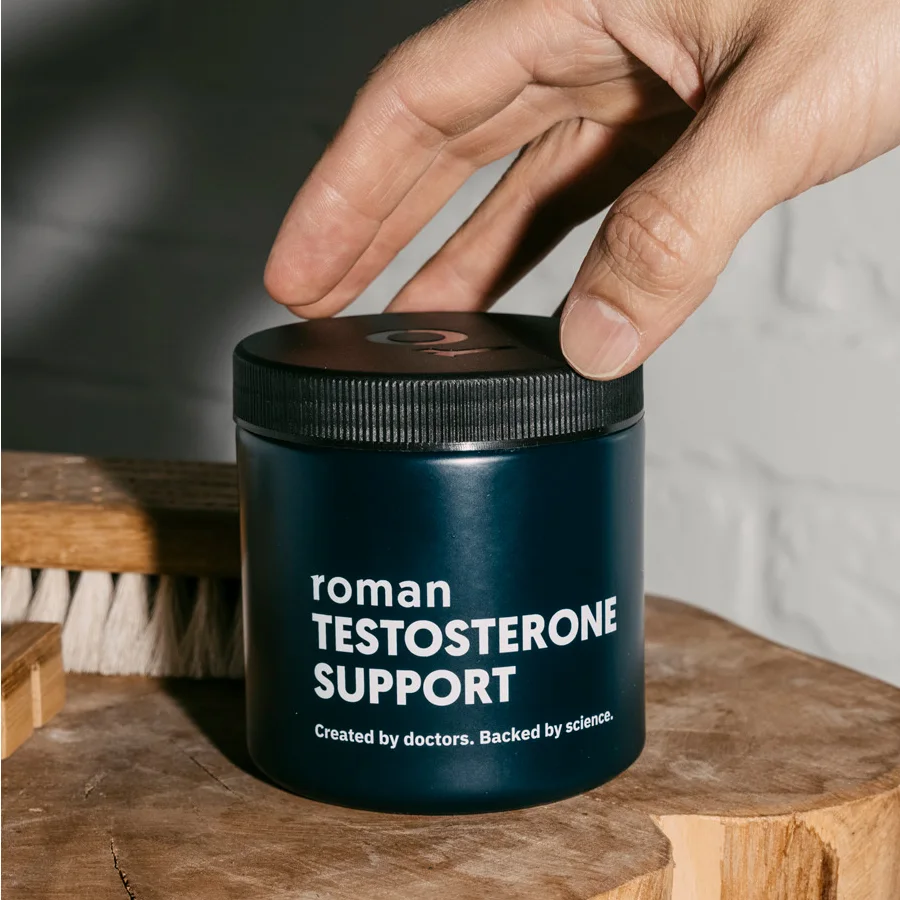Here's what we'll cover
Here's what we'll cover
Here's what we'll cover
Low testosterone, or hypogonadism, affects 40% of men older than 45 and half of men over 80. But just because low T is common, that doesn’t make its symptoms—which can range from reduced sex drive to body hair loss—any less frustrating (Sizar, 2022).
Whether you have low T or are just interested in your sexual health, you’ve probably heard that masturbating affects testosterone levels. Read on as we explore whether there’s any truth to this and if refraining from masturbation really does raise testosterone.
Masturbation and testosterone: what’s the connection?
Here’s the short answer: while masturbation may have a short-term effect on testosterone levels, it does not seem to affect your baseline in the long term (Mascherek, 2021).
We wish we could give you a more straightforward answer, but there’s a reason why scientists have a tough time nailing down a definitive answer to the question of how masturbation affects testosterone. For one thing, as you might imagine, it is difficult to replicate the real-world conditions for masturbation in a laboratory setting, where scientific studies tend to be conducted.
For another, several factors cause testosterone levels to change throughout life—and even day-to-day. Your age is one such factor, as testosterone levels naturally lower as men grow older (Sizar, 2022). And thanks to our circadian rhythm, testosterone levels fluctuate during the day, reaching their highest in the morning and lowest at night (Brambilla, 2009). Even skipping a meal may affect your testosterone levels (Trumble, 2010).
What are the effects of masturbation on testosterone, specifically? It’s not crystal clear. Much of the research to date has been conducted in relatively small, sometimes conflicting studies. More research is still needed.
A peek into the research history
Generally, testosterone levels increase temporarily after watching erotic stimuli, such as pornography, or feeling sexual desire (Mascherek, 2021). However, the extent to which they increase may depend on what happens next. One study measured salivary testosterone levels in men who visited a sex club. Their testosterone levels increased across the board, but they increased more among those who participated in sexual activity than those who merely observed (Escasa, 2011).
In the early 1970s, a small study of seven men concluded that masturbation does not affect testosterone levels (Fox, 1972). A late 1990s study looked at how the lack of sexual activity affected testosterone in men with erectile dysfunction. After three months of treatment, those who successfully resumed sexual activity had higher levels of testosterone (Jannini, 1999).
However, in 2003, researchers observed that testosterone levels changed about a week after the last ejaculation in men abstaining from masturbation. While there were minimal fluctuations in testosterone levels during days 2 to 5, there was a clear peak on the seventh day, when the participants’ serum testosterone levels were 145% higher than the baseline (Jiang, 2003). Similarly, another study suggests that three weeks of sexual abstinence (solo and partnered) may lead to higher testosterone levels (Exton, 2001).
All that’s to say that the research is conflicting and inconclusive.
Do you lose testosterone if you ejaculate?
Along the same lines, probably not. Masturbation and ejaculation do not have a long-term effect on serum testosterone levels. Studies suggest that testosterone increases either immediately after sexual activity or does not change at all (Fox, 1972; Exton, 2001).
Having said this, it’s not impossible for masturbation to negatively impact testosterone levels in men, although it would happen indirectly. Due to religious and cultural expectations, some people may experience a negative emotional response to sexual arousal and masturbation, such as guilt. Over time this can build up into symptoms of depression, which have been associated with low T levels (Khera, 2013; Mascherek, 2021).
How to increase testosterone
There are several ways to increase testosterone levels if you have low T. Getting better sleep and reducing stress are two great options, as are improving your diet and exercise routine (Harden, 2016; Liu, 2019). There are effective medications available, too.
Exercise regularly
When it comes to better health, it seems regular exercise is always the answer—and it holds true for men’s testosterone levels as well. Research shows that physically active men have higher testosterone levels and healthier semen production than men who follow a more sedentary lifestyle (Vaamonde, 2012).
Eat a healthy diet
Low testosterone levels are associated with increased body fat and an increased risk of obesity. In men with excess body fat, weight loss may increase testosterone levels (Kelly, 2015).
So, what should you eat? A 2020 study found that men who followed a low-fat diet had lower testosterone levels, while those with less restrictive diets had higher serum testosterone levels (Fantus, 2020).
Another study found an association between low T and a pattern of frequently dining out and eating a lot of bread, dairy, and desserts. These men also tended to eat fewer homemade foods and dark green vegetables. However, the authors acknowledged that more research is still needed to determine whether and how changing your diet can improve testosterone levels (Hu, 2018).
Medications
Testosterone replacement therapy (TRT) may be recommended for men with diagnosed hypogonadism. TRT comes in many forms, including prescription gels, patches, and oral medication. Throughout treatment, your healthcare provider will likely monitor your testosterone levels (Sizar, 2022).
TRT is not recommended in men with symptomatic low T who want to try to have a child, since it stops sperm production. Another medication, clomiphene (brand name Clomid), may be a good option in those cases.
Rest assured, masturbation is a normal part of a healthy sex life and does not have a long-term impact on your testosterone levels.
DISCLAIMER
If you have any medical questions or concerns, please talk to your healthcare provider. The articles on Health Guide are underpinned by peer-reviewed research and information drawn from medical societies and governmental agencies. However, they are not a substitute for professional medical advice, diagnosis, or treatment.
References
Brambilla, D. J., Matsumoto, A. M., Araujo, A. B., & McKinlay, J. B. (2009). The effect of diurnal variation on clinical measurement of serum testosterone and other sex hormone levels in men. The Journal of Clinical Endocrinology and Metabolism, 94 (3), 907–913. doi:10.1210/jc.2008-1902. Retrieved from https://pubmed.ncbi.nlm.nih.gov/19088162/
Escasa, M. J., Casey, J. F., & Gray, P. B. (2011). Salivary testosterone levels in men at a U.S. sex club. Archives of Sexual Behavior , 40 (5), 921–926. doi:10.1007/s10508-010-9711-3. Retrieved from https://pubmed.ncbi.nlm.nih.gov/21165688/
Exton, M. S., Krüger, T. H., Bursch, N., et al. (2001). Endocrine response to masturbation-induced orgasm in healthy men following a 3-week sexual abstinence. World Journal of Urology , 19 (5), 377–382. doi:10.1007/s003450100222. Retrieved from https://pubmed.ncbi.nlm.nih.gov/11760788/
Fantus, R. J., Halpern, J. A., Chang, C., et al. (2020). The association between popular diets and serum testosterone among men in the United States. The Journal of Urology , 203 (2), 398–404. doi:10.1097/JU.0000000000000482. Retrieved from https://pubmed.ncbi.nlm.nih.gov/31393814/
Fox, C. A., Ismail, A. A., Love, D. N., et al. (1972). Studies on the relationship between plasma testosterone levels and human sexual activity. The Journal of Endocrinology, 52 (1), 51–58. doi: 10.1677/joe.0.0520051. Retrieved from https://pubmed.ncbi.nlm.nih.gov/5061159/
Harden, K. P., Wrzus, C., Luong, G., et al. (2016). Diurnal coupling between testosterone and cortisol from adolescence to older adulthood. Psychoneuroendocrinology, 73 , 79–90. doi:10.1016/j.psyneuen.2016.07.216. Retrieved from https://pubmed.ncbi.nlm.nih.gov/27474909/
Hu, T. Y., Chen, Y. C., Lin, P., et al. (2018). Testosterone-associated dietary pattern predicts low testosterone levels and hypogonadism. Nutrients , 10 (11), 1786. doi:10.3390/nu10111786. Retrieved from https://pubmed.ncbi.nlm.nih.gov/30453566/
Jannini, E. A., Screponi, E., Carosa, E., et al. (1999). Lack of sexual activity from erectile dysfunction is associated with a reversible reduction in serum testosterone. International Journal of Andrology, 22 , 385-392. doi:10.1046/j.1365-2605.1999.00196.x. Retrieved from https://onlinelibrary.wiley.com/doi/full/10.1046/j.1365-2605.1999.00196.x
Jiang, M., Xin, J., Zou, Q., & Shen, J. W. (2003). A research on the relationship between ejaculation and serum testosterone level in men. Journal of Zhejiang University. Science , 4 (2), 236–240. doi:10.1631/jzus.2003.0236. Retrieved from https://pubmed.ncbi.nlm.nih.gov/12659241/
Kelly, D. M. & Jones, T. H. (2015). Testosterone and obesity. Obesity Reviews: An Official Journal of the International Association for the Study of Obesity , 16 (7), 581–606. doi:10.1111/obr.12282. Retrieved from https://pubmed.ncbi.nlm.nih.gov/25982085/
Khera, M. (2013). Patients with testosterone deficit syndrome and depression. Archivos Espanoles de Urologia, 66 (7), 729–736. Retrieved from https://pubmed.ncbi.nlm.nih.gov/24047633/
Liu, P. Y. (2019). A clinical perspective of sleep and andrological health: assessment, treatment considerations, and future research. The Journal of Clinical Endocrinology and Metabolism, 104 (10), 4398–4417. doi:10.1210/jc.2019-00683. Retrieved from https://pubmed.ncbi.nlm.nih.gov/31042277/
Mascherek, A., Reidick, M. C., Gallinat, J., & Kühn, S. (2021). Is ejaculation frequency in men related to general and mental health? Looking back and looking forward. Frontiers in Psychology , 12 , 693121. doi:10.3389/fpsyg.2021.693121. Retrieved from https://pubmed.ncbi.nlm.nih.gov/34434144/
Phillips-Farfán, B. V., Lemus, A. E., & Fernández-Guasti, A. (2007). Increased estrogen receptor alpha immunoreactivity in the forebrain of sexually satiated rats. Hormones and Behavior , 51 (3), 328–334. doi:10.1016/j.yhbeh.2006.12.001. Retrieved from https://pubmed.ncbi.nlm.nih.gov/17239879/
Romano-Torres, M., Phillips-Farfán, B. V., Chavira, R., et al. (2007). Relationship between sexual satiety and brain androgen receptors. Neuroendocrinology , 85 (1), 16–26. doi:10.1159/000099250. Retrieved from https://pubmed.ncbi.nlm.nih.gov/17268169/
Sizar, O. & Schwartz, J. (2022). Hypogonadism. StatPearls . Retrieved on Oct. 13, 2022 from https://www.ncbi.nlm.nih.gov/books/NBK532933/
Trumble, B. C., Brindle, E., Kupsik, M., & O'Connor, K. A. (2010). Responsiveness of the reproductive axis to a single missed evening meal in young adult males. American Journal of Human Biology, 22 (6), 775–781. doi:10.1002/ajhb.21079. Retrieved from https://pubmed.ncbi.nlm.nih.gov/20721980/
Vaamonde, D., Da Silva-Grigoletto, M. E., García-Manso, J. M., et al. (2012). Physically active men show better semen parameters and hormone values than sedentary men. European Journal of Applied Physiology , 112 (9), 3267–3273. doi:10.1007/s00421-011-2304-6. Retrieved from https://pubmed.ncbi.nlm.nih.gov/22234399/



